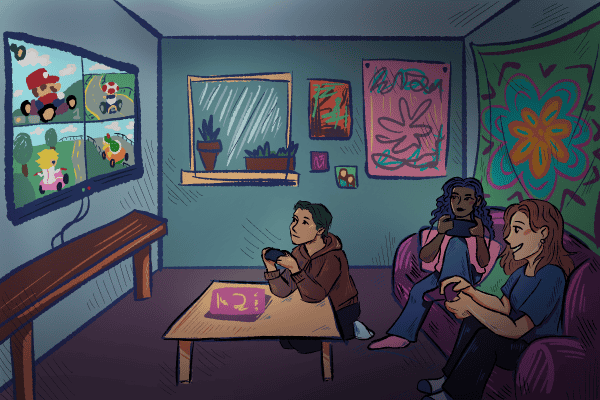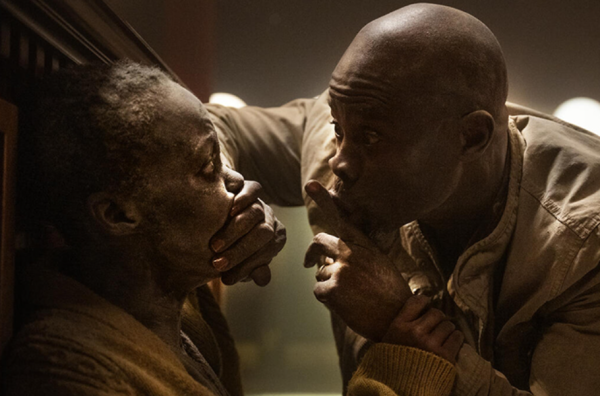Film Column: ‘Miss Americana’ shows the reality of fame
March 1, 2020
Netflix’s new Taylor Swift documentary delves into the singer’s vulnerability and uncovers emotional stress from her career over the past decade.
“Miss Americana” fully pulls viewers into Taylor Swift’s story, the parts of her life hidden between the lines of fame. The documentary uncovers what audiences didn’t know Swift was capable of. Her songs may be filled with emotion, but the public didn’t explicitly know what she was going through until this debut.
From inside Swift’s fame, the audience could start to feel bad for her, but instead, a viewer should see a powerful woman going through the often-tiresome cycles of fame. Fans have seen the innocent Swift through albums like “Speak Now” and “Fearless,” but now the artist has become a rebel with newer albums like “Reputation” and “Lover.”
This narrated documentary starts out with the singer-songwriter playing “Lover” on the piano with one of her many kittens strolling across the black and whites. The narrative guides viewers through Swift’s ups and downs throughout her music career – a story about her storytelling music. Swifties grew up with Miss Americana and saw her music mature as she grew into the woman she is today – a testament to time’s effect on her life and career.
In the film, Swift’s songwriting process shows how excited she is when she finds the lyrics that add to the story, making you want to be right there with her writing those hits. Swift related her albums to her fans like they’re “reading her diary.” Her whole music career is her story that she wrote, every detail and every feeling stitched into each song, making fans appreciate her and her music so much more.
Swift explained that if she’s not writing it, then it’s not her; she’s gotten to where she has by writing her own music.
“Everybody has their own sort of niche or specialty thing that they do that, you know, sets them apart from everybody else,” Swift says in the Netflix original. “And my storytelling is what is for me. I know that without me writing my own songs, I wouldn’t be here.”
Swift was trying to share a message to the world that she isn’t going anywhere and that her opinion is ready to shine.
“No one is this good and works harder,” one of Swift’s producers says. “Usually, if you’re that good, you don’t work that hard.”
Swift stepped out of her celebrity bubble to let us in on her insecurity of not being good enough, making her fanbase feel understood and not alone when those thoughts start to rise. Not wanting to have the paparazzi take her picture all the time due to body image concerns, Swift had the same hardship of comparing herself to others.
Miss Americana said it best: “There’s always some standard of beauty you’re not meeting, because if you’re thin enough, then you don’t have that ass that everybody wants. But if you have enough weight on you to have an ass, then your stomach isn’t flat enough. It’s all just f—ing impossible.”
Swift talked about her mental health and how her 2009 feud with Kanye West really hit hard.
“For someone whose whole belief system is getting people to clap for you, the whole crowd booing you is a pretty formative experience,” Swift said. “That was sort of a catalyst for the psychological paths that I went down. And not all of them were beneficial at all.”
Swift’s dream was to win a second Album of the Year at the Grammys, to know she made it, that she redeemed herself from Kanye’s embarrassment. When she finally achieved that dream with “1989,” she described her achievement as lonely, no one to call, not her “millions of boyfriends” or her “model squad” that everyone pointed out that she had. She had no one, an expression of what fame is really like, how being “Taylor Swift” really felt at that moment.
Her downfall of no longer being America’s sweetheart made her find her center and fall away from the center of attention, going away from the paparazzi and refocusing on herself. Having the inside peek into Taylor’s personal life – keeping in touch with high school friends and surrounding herself with her family, while also maintaining a private love life – shoots those haters down when they try to say that she is consumed with boys and models.
Seeing Swift choke up about her mom’s cancer was emotionally provoking – the revelation of not caring about what others think, especially while her “best friend is sick from chemo,” shows her growth from previously being a dedicated people pleaser. Sometimes the audience can forget that Swift is a person, but Swift is real and raw, and this documentary shows that.
Swift shows she’s not only interested in music, and her interest in politics shines in this narrative. Afraid of pushing her opinions on people, Swift is worried about being labeled the next Dixie Chicks, a band whose political opinions spiraled their downfall.
“But a nice girl doesn’t force their opinions on people,” Swift said. “A nice girl smiles and waves and says ‘thank you.’ A nice girl doesn’t make people feel uncomfortable with her views. I was so obsessed with not getting in trouble that I was like, ‘I’m just not gonna do anything that anyone could say anything about.’ I’m getting to the point where I can’t listen to people telling me ‘No, stay out of it.’ … I wanna wear pink and talk about politics. I don’t think that those should cancel each other out.”
Swift takes politics by the reins and throws her political opinion into the social media air, despite her fear of being scorned.
Her first political statement comes against the Marsha Blackburn campaign. Swift doesn’t agree with Blackburn’s opposition to abortion and LGBTQ community rights. When Blackburn won, it broke Swift’s heart but fueled her new single introduced in the documentary, “Only the Young.” The single meant to show that you can keep fighting for what you want – especially if you are young, your voice still matters, and as college students, we should be inspired.
Swift also took a stand for women who have been sexually assaulted following her own sexual harassment case. Her “dehumanizing” trial promoted Swift to send out an apology to all the women who weren’t believed or have fallen victim to such evil before at one of her concerts. Having such a well-known celebrity be touched in such an inappropriate way with such security surrounding her, a celebrity that is thought to be “untouchable,” is terrifying. It is empowering to see her find the strength to stand up for others and share her experience with the world.
The sentimental closing of the documentary sends you through a retrospective of films, from Swift walking into a stadium to sing the national anthem at 10 to a 29-year-old pop star going to sing for millions. From the phone call that crushed her spirits from “Reputation” not being nominated at the Grammys, to composing a comeback album, “Lover,” Swift grew into a fearless woman who knows what she wants.











